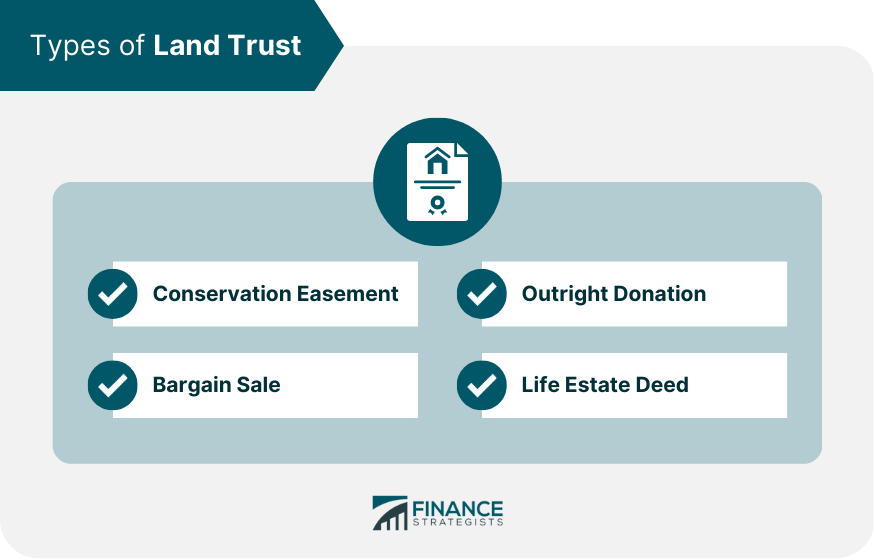Land trusts are nonprofit organizations that work towards conserving land for the public benefit by protecting natural and cultural resources and providing public access. Land trusts achieve this objective by acquiring land, preserving it in its natural state, and managing it in perpetuity. These organizations offer landowners a chance to donate or sell land for conservation purposes while retaining land ownership. By doing so, landowners can achieve their conservation objectives, secure tax benefits, and avoid future development on their property. Have questions about Land Trusts? Click here.
Landowners can use various kinds of land trusts to preserve their land. These include conservation easements, outright donations, bargain sales, and life estate deeds. Conservation Easement. This is a legal agreement between a landowner and a land trust, where the landowner agrees to limit the use of the land to conservation purposes only. Outright Donation. This is a gift of the land to the land trust, where the landowner gives up all rights and control of the land. Bargain Sale. This is a land sale at less than its fair market value, where the landowner donates a portion of the sale price to the land trust. Life Estate Deed. This is a legal agreement between a landowner and a land trust. The landowner retains the right to use the land for their lifetime, and upon their death, the land passes to the land trust. There are several benefits that a landowner can enjoy by using land trusts. One significant benefit is that a land trust can help reduce the property tax burden on a landowner. When landowners donate land to a land trust, they are eligible for tax deductions, including income, estate, and property tax deductions. The donation value is usually determined by an appraisal conducted by an independent appraiser. Another benefit of a land trust is that it can protect the land from future development. Land trusts ensure that the land remains in its natural state by prohibiting future development on the land. This way, the land is protected from subdivision, commercial, and residential development. Conservationists use land trusts to protect natural and cultural resources, such as wildlife habitats, water resources, and scenic landscapes. Land trusts help conservationists achieve their conservation objectives by acquiring and managing land perpetually. The importance of land trusts for conservationists cannot be overstated. Land trusts play a critical role in preserving natural resources and habitats for future generations. Conservationists can protect ecosystems, wildlife habitats, and biodiversity through land trusts. Land trusts also provide public access to these protected areas, where visitors can enjoy and learn about nature. Land trusts can have significant impacts on property values and transactions, and it is essential for real estate professionals to understand these impacts. Land trusts can restrict future development on the land, reducing the potential for commercial and residential development. This restriction can have a negative impact on property values in areas where demand for development is high. However, in areas where demand for conservation is high, such as near protected natural areas, land trusts can positively impact property values. Real estate professionals can also use land trusts to protect their clients' land while ensuring that it remains productive and valuable. Government officials and policymakers play a critical role in regulating land use and protecting natural resources. Land trusts can be a valuable tool for government officials and policymakers to achieve conservation goals and protect natural resources. Land trusts can be used by government officials and policymakers to advance conservation goals in several ways. Land trusts can work with government agencies to identify and protect critical habitats and ecosystems. This collaboration can ensure that conservation efforts are targeted to areas where they are most needed and can have the greatest impact. Land trusts can help government agencies achieve their conservation objectives by acquiring land and managing it in perpetuity Land trusts can leverage their expertise in land management and conservation to ensure that land is preserved in its natural state and managed for the public benefit. Land trusts can work with government agencies to provide public access to protected lands. There are several ways that nonprofit organizations and philanthropists can support land conservation efforts through partnerships with land trusts. Nonprofit organizations can donate funds to support land acquisition and restoration projects. Nonprofit organizations can partner with land trusts to develop conservation programs and initiatives. These partnerships can include joint fundraising campaigns, public education and outreach, and community engagement activities. Nonprofit organizations and philanthropists can support land conservation efforts by providing grants to land trusts. Land trusts are a powerful tool for protecting natural and cultural resources and providing public access to these resources. Landowners, conservationists, real estate professionals, nonprofit organizations, philanthropists, government officials, and policymakers can benefit from partnering with land trusts to achieve their conservation objectives. Although land trusts are subject to legal and regulatory frameworks, they offer flexible and effective solutions for conservation that benefit all stakeholders. If you are interested in using land trusts for conservation purposes, it is essential to seek advice from an estate planning lawyer who can guide you through the process and help you achieve your conservation goals. What Are Land Trusts?
Types of Land Trusts

Benefits of Land Trust for Landowners

Benefits of Land Trust for Conservationists
Benefits of Land Trust for Real Estate Professionals
Benefits of Land Trust for Policymakers
This public access can provide opportunities for outdoor recreation, environmental education, and scientific research, benefiting both the public and the environment.How to Support Conservation Efforts Through Land Trusts
Land trusts rely on donations to acquire and manage land for conservation purposes, and donations from nonprofit organizations and philanthropists can make a significant impact.
Grants can be used to support specific conservation projects, such as habitat restoration, public access improvements, or research and monitoring programs.Conclusion
Land Trust FAQs
A land trust is a nonprofit organization that works towards conserving land for the public benefit by protecting natural and cultural resources and providing public access to them.
Land trusts can help reduce the property tax burden on landowners and protect the land from future development. Landowners can donate or sell land to a land trust while still retaining ownership, control, and use of the land.
Conservationists can use land trusts to protect natural and cultural resources, such as wildlife habitats, water resources, and scenic landscapes, and provide public access to these protected areas for outdoor recreation, environmental education, and scientific research.
Land trusts can impact property values by restricting future development on the land, which can reduce property values in areas where demand for development is high. However, land trusts can positively impact property values in areas where demand for conservation is high.
Government officials and policymakers can work with land trusts to identify and protect critical habitats and ecosystems, acquire and manage land in perpetuity, and provide public access to protected lands. This collaboration can ensure that conservation efforts are targeted to areas where they are most needed and can have the greatest impact.
True Tamplin is a published author, public speaker, CEO of UpDigital, and founder of Finance Strategists.
True is a Certified Educator in Personal Finance (CEPF®), author of The Handy Financial Ratios Guide, a member of the Society for Advancing Business Editing and Writing, contributes to his financial education site, Finance Strategists, and has spoken to various financial communities such as the CFA Institute, as well as university students like his Alma mater, Biola University, where he received a bachelor of science in business and data analytics.
To learn more about True, visit his personal website or view his author profiles on Amazon, Nasdaq and Forbes.











